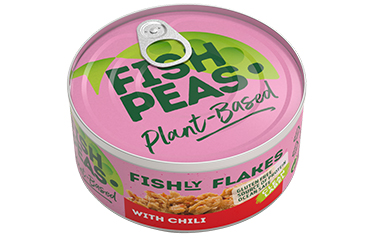Karavela unveils plant-based seafood range and brand Fish Peas

Riga, Latvia-headquartered fish canning company SIA Karavela has launched a new plant-based seafood analog product line and brand, Fish Peas.
Made mainly from yellow peas, the new seafood alternative range is the result of two years’ work, Karavela CEO and Co-owner Andris Bite said during an online launch event.
“We are very active in new product development, and constantly investing in R&D with some quite significant sums of money. This year, we will invest very close to EUR 1 million [USD 1.2 million], and that helps us to bring new ideas and fresh value-added products to our customers and the final buyers of our products,” Bite said.
Overall, the company has invested around EUR 2.5 million (USD 2.9 million) in the first stage of the Fish Peas project.
The new product range comprises salads, spreads, and flakes. In terms of taste, Karavela describes Fish Peas products as having a slightly softer, less-intense fish taste compared with regular canned tuna.
Although this also depends on which product is being consumed, with the spreads and salads being similar to the company’s existing tuna products, Karavela Marketing Manager Rolands Romanovskis told SeafoodSource.
While the company is ready to start production, it is at present focused on choosing the right partners for the new offering, and as such, the size of the real trade and the markets it will be sold in will depend on the partner-specific requirements of each country, Romanovskis said.
“The end of the year is always a busy time, so we are ready, but the product launch will depend more on customers’ abilities to launch a product in their category,” Romanovskis said.
Romanovskis confirmed the company's current plan is to also use yellow peas for the manufacture of its new vegan tuna fillet product – which is expected to be launched next year.
“But since we are quite ‘new’ in this segment and we do not know how that market will change in a year, we have to be ready to adapt to some more new trends, which can come, and probably we should us some other raw materials,” Romanovskis said. “But right now, we are quite sure that we will use yellow peas.”
According to Karavela, as well as being very rich in amino acids, high in iron, and low in cholesterol, yellow peas are “five or six times more climate-friendly” than soy.
The new product, Romanovskis said, will target the growing market for alternative seafoods in Europe. Analysts predicted that 2021 would see increasing popularity of seafood analogs, and those predictions have largely proven true given the continuing gains in popularity in Europe.
“This is a new trend in which all experts point to a sharp increase in market share in the coming years. However, only time and real work will show how this segment will develop,” Romanovskis said. “We need to understand that this is not traditional competition where fish products can compete for shelf space with other, similar products, such as meat or canned vegetables. In this case, it is initially about the protein itself, because there is no such vegan fish, meat, or anything else. It’s just a form, but the basis of everything is soy, peas, and so on.”
The market segment, Romanovskis said, has key differences from traditional seafood that Karavela will take advantage of.
“We should understand for which category we are focusing on – vegan, vegetarian, flexitarians, etcetera,” Romanovskis said. “The next question is which shelf the product will end up on – either vegan or with traditional [canned fish' products. We designed and created our product in that way – to be interesting for all consumer groups.”
According to Bite, Karavela is the fastest-growing fish canning company in Europe.
“Last year, we produced around 91 million cans of seafood, and exported to 46 countries,” he said.
Bite also said that from his point of view, the 2022 launch of vegan tuna fillets will be “the biggest development” in the alternative seafood product group to date.
“I can definitely say that we are moving in the right direction,” Bite said. “And I strongly believe that these vegan tuna fillets will be the game-changer in the plant-based seafood market.”
In 2020, Karavela processed more than 16,000 metric tons (MT) of fish. It also posted its best-ever turnover of EUR 66 million (USD 77.2 million). Its main raw materials are mackerel, herring, sardines, sprats, tuna, mussels, and salmon. It also purchases surimi shrimps and crab claws from VIČI.
Photo courtesy of Karavela






Share